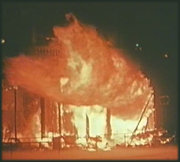Eighty years ago this week, RAF Bomber Command finally comes of age and the conquest of Palermo masks flaws in allied planning in Sicily
RAF Bomber command launched Operation Gomorrah under which the port city of Hamburg was to be bombed over several days. Almost everything was in favour of the attackers. Bomber Command now fielded a force of some 800 aircraft, mainly four-engined bombers, notably the highly effective Lancaster. H2S navigation radar had been fully introduced and the broad river Elbe leading from the sea to the city provided unmistakable images. After long top-level debate the use of Window had been authorized. Bundles of metal strips were dropped creating confusing images on the defenders' radar, which meant that fighter opposition was weak to negligible. Bomber casualties were low at some 3%. The weather was favourable both to the attackers and to the effect of the bombing; individual fires burned strongly enough to merge into a gigantic firestorm. After years of failure Bomber Command was finally able to put to the test the Trenchardian doctrine that bombing was able to win a war. The city was devastated and perhaps 34,000 of its inhabitants were killed, probably the greatest loss of life through bombing in Europe. German morale, though, survived; Gomorrah's military value lay in making the Germans switch precious resources to air defence. They had already practically lost the war economically and the imperative to defend the homeland against allied bombing made their problems all the more acute.
General
Patton took full advantage of the remit for quasi-independent action
that he had been granted in Sicily by his notional commander General
Alexander. Making full use of his superior mobility and well-trained
infantry he stormed north across the island and seized its capital, the
port city Palermo. The triumph masked flaws in the allied conduct of the
campaign. Palermo had been designated as a major objective of the
invasion but it was a distraction from the great potential prize of the
action: trapping a large number of German defenders. The Germans had
decided not to make a fight of defending the island and the key to their
escape was the port of Messina nearest to the Italian mainland, which
lay in the British sector. In the absence of a properly unified
US/British command, the military importance of Messina had slipped down
the order of priorities
The
Fascist Grand Council meeting for the first time since the war broke
out voted by a large majority in favour of a motion tabled by Count
Grandi to strip Mussolini of his military authority. A two-hour speech
by the Duce failed to sway them in his favour. They recognized that the
game was over. Mussolini drew the inevitable conclusion and resigned to
the king the following day.



Comments
Post a Comment